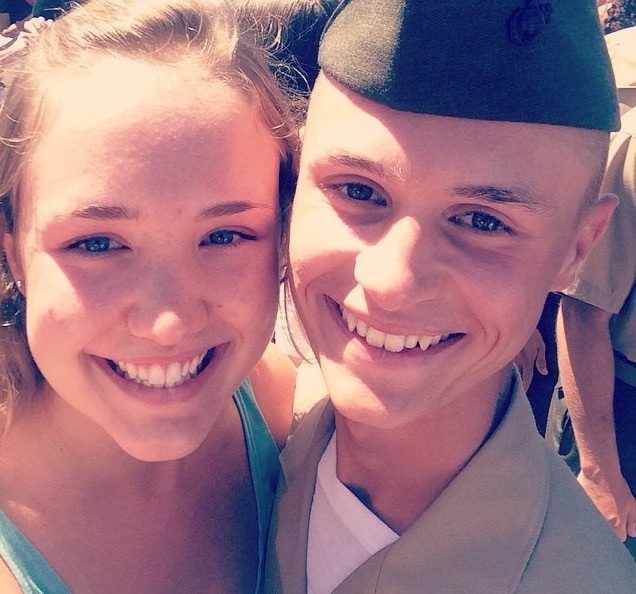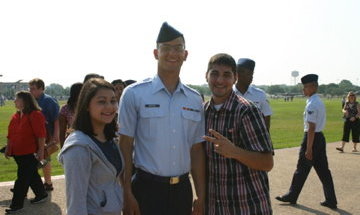
Junior Dana Sherman met her boyfriend Phoenix Thompson in high school in Shoreview, Minn. When it was time to decide what to do after graduation, Sherman chose Dallas and SMU. Thompson decided to enlist in the United States Marines Corps. He is currently serving a 2-year deployment in Okinawa, Japan, 7,164 miles from Dallas.
“At first, I was like ‘wow’ we really drew the short end of the stick with getting stationed all the way of there,” said Sherman. “But then, I realized that I am lucky that he is not in a combat zone where he is going to be at high risk for getting hurt.”
Sherman believes she and Thompson do not have much control over their relationship. They are not able to choose where he lives. It was hard for Sherman to deal with the long distance during her first year at SMU. Sherman studied abroad last semester and was able to visit Thompson twice.
“In one way, I feel like the government is manipulating our relationship,” said Sherman, who is majoring in studio art, health and society.
More than 2 million people were serving in the United States Armed Forces in June 2013, according to the U.S. Bureau of Labor and Statistics. Service members receive support from the government, community organizations and strangers, such as educational and health benefits, care packages, language programs and therapy.
However, their loved ones go through what is called a ‘silent struggle.’ Many believe it is hard for others to understand what it is like to have a loved one in service. Some live in fear of the unknown, feel alone or battle with frustration of other’s reactions. Sherman does not tell people about her struggles unless asked directly.
“It makes it hard to talk to about it with anyone. People won’t get what you are saying or where you are coming from,” Sherman said. “When you do talk about it with people, they will be like: ‘Oh I’m so sorry.’ It’s my choice. I chose to be in this relationship. I am not looking for pity when I tell people.”
There is no official number on how many SMU students have loved ones in the military. However, there were 108 undergraduate student veterans at SMU last year. One highly positioned SMU administrator has a son in the military. The official did not want her name used because of the sensitive nature of her son’s work.
“Sometimes people express surprise that someone has a loved one in the military, especially college students who do not know many peers who have chosen to serve,” said the official. “They should know about the sacrifice and tremendous responsibilities being carried out by young people who are often younger than they are, yet are in harm’s way and making decisions under complex and dangerous situations.”
Not all SMU students have loved ones stationed overseas. Seniors Kaycee Morganto and Jessica Martinez have brothers stationed in the U.S.

Morganto, a mechanical engineering and music double major, has a brother who enlisted into the Marines six months ago. Pvt. Patrick Morganto, 18, is stationed at Camp Gilbert H. Johnson, N.C.
“I joined because the Marine Corps was the most…badass organization on the planet,” said Morganto in a phone interview.
However, it was hard for Morganto’s family, who live in Plano, to understand why he wanted to join the Marines at first. He is the first person in their family to enlist.
Many civilians believe that people in the armed forces are brave. However, many family members live in fear. Morganto believes his family was afraid of the possibility that he could die due to the combat nature of the Marines.
“From how my family reacts, it is hard for them to understand how I am not there,” said Morganto. “I might not come back.”
His older sister agrees.
“I spent my whole life looking after him,” Kaycee Morganto, 22, said. “It was a time of realization that he’d grown up and I couldn’t save him from trivial bullies anymore.”
The University official with the son in the military said that SMU students can seek support from the University by talking with SMU counselors and talking to student veterans. Student veterans can help them decide what is the best way to help and honor loved ones.
Maguire Center for Ethics and Public Responsibility Director Rita Kirk has a son in the Marines. Pfc. Robert Whilock has served in the Marines for almost 5 years. Kirk believes that one of the best ways to support a loved one is through prayer.
“At this time of the year, praying for peace brings on a different meaning. We sometimes say pray for peace but I think for the families a prayer of peace is really important prayer,” said Kirk, a professor of communication studies. “You pray for their safety, their courage, and for their training to have been really effective, for them to might continue to make wise choices because we are all human and are subject to error.”

Military life is normal for Martinez, a Spanish major, and her family.
“It’s unofficially what the men do,” said Martinez.
Her brother Staff Sgt. Juan Martinez and his wife are active in the United States Air Force. Her oldest brother, Ray Martinez, her uncle and her grandfather are all retired airmen. Also, Martinez has a cousin who served in the U.S. Navy and was stationed in Baghdad.
Martinez believes people do not always understand that many people in the service love what they do. Some people assume that everyone in the military did not want to attend college or did not know what they wanted to do with their lives.
“Some people do go in for the benefits, but they end up staying in for a while because they love it,” said Martinez. “My brother is making a career out of it.”
The military provides opportunities for service members to receive an affordable education due to the Post-9/11 GI Bill’s Yellow Ribbon Program. The Veteran’s Association works with universities to pay tuition for veterans who served on or after 9/11.
Morganto agrees that many people don’t understand.
“There are a lot of misconceptions about it. A lot of people don’t understand that everyone wants to be here,” said Morganto.
Kirk believes people understand when a loved one is serving the country. However, they do not always understand what rights they are sacrificing.
“People that are in the military surrender their free speech rights, their job is to follow orders to be a fighting unit, not to be a debating whether orders are correct or incorrect,” Kirk said. “It falls on the rest of us to make sure that we provide a voice for them.”








